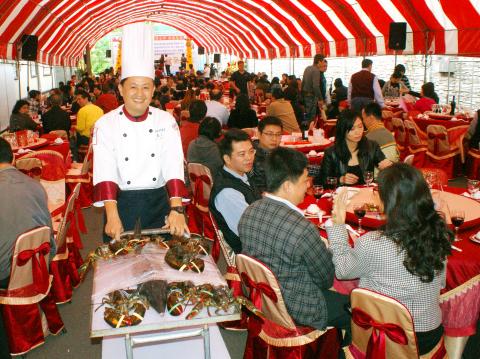The catering industry is suffering as businesses are reducing the scope of their annual banquets or simply deciding not to hold the events this year since the economy is doing so poorly. Some chefs, however, are insisting that quality not be affected and are refusing to lower prices to compete in the market, while some are creating new dishes to attract more customers and working hard to make it through these tough times.
Chi Jung-chun, a chef with Tainan’s Formosa Chefs Association, says that catering orders from various companies usually come pouring in around the time annual banquets are held, typically bringing in anywhere from 400 to 500 tables for him. This year, however, orders for not even half that many tables are being made, evidence of an economic downturn.
Chi says that a lot of companies have canceled their annual parties due to poor sales and reduced profits, handing out red envelopes filled with cash to employees instead. Although a few companies are actually seeing profits, they feel that holding an annual banquet would be too lavish and contentious in these tough times as the economy is in a slump, so they are saving money by not holding the events and giving out cash to employees instead — a major blow to the catering industry.

Photo: Wu Chun-fong, Liberty Times
照片:自由時報記者吳俊鋒
Chen Ya-chia, another chef with Tainan’s Formosa Chefs Association, says that since many companies are making less money yet would still like to hold annual banquets while also saving money at the same time, catering companies are facing the dilemma of either slashing prices to compete or choosing to continue offering quality catering.
In order to maintain the normal amount of catering orders, Lu Cheng-chih, a chef who won first prize at the World Golden Chef Competition, has teamed up with people working in other fields to enhance the performance arts aspect of his catering events, cooking up something fresh and lively for his customers. He is also giving performances while the food is being served and displays the catching of seafood during the events, highlighting the freshness of the ingredients used and improving the overall presentation of catering services, which has successfully attracted more customers and allowed his catering business not to be affected by the downturn.
(Liberty Times, Translated by Kyle Jeffcoat)
經濟差,景氣壞,廠商辦年終尾牙有的縮水、甚至停辦,外燴業者叫苦,但仍有主廚堅持品質,不願削價競爭,也有總舖師推出新菜色,爭取客源,努力捱過景氣寒冬。
台南市福爾摩沙廚藝協會的總舖師机榮俊說,以往尾牙期間,各公司行號的外燴訂單接踵而至,累計都有四、五百桌,今年卻一半還不到,顯見景氣之差。
机榮俊說,很多公司因業績衰退而取消尾牙,有的盈餘減少,僅發紅包應景,少數廠商雖然賺錢,但顧及景氣不佳的社會氛圍,擔心熱鬧辦桌太高調,引來炫富之議,將活動經費折算現金分給員工,導致外燴訂單大受衝擊。
協會另位總舖師陳亞家說,許多公司因獲利減少,想辦桌吃尾牙,卻希望壓低經費,若削價競爭,將無法兼顧餐宴,進退兩難。
在世界金廚爭霸賽獲得首獎的總舖師盧正治為了穩住尾牙業績,除與異業結盟,加強辦桌活動的綜藝表演,炒熱氣氛,更推出上菜秀,展示現撈的水產食材,凸顯料理的新鮮度,提升外燴的質感,成功吸客,今年尾牙業績影響不大。
(自由時報記者吳俊鋒)

In an effort to fight phone scams, British mobile phone company O2 has introduced Daisy, an AI designed to engage phone con artists in time-wasting conversations. Daisy is portrayed as a kindly British granny, exploiting scammers’ tendency to target the elderly. Her voice, based on a real grandmother’s for authenticity, adds to her credibility in the role. “O2” has distributed several dedicated phone numbers online to direct scammers to Daisy instead of actual customers. When Daisy receives a call, she translates the scammers’ spoken words into text and then responds to them accordingly through a text-to-speech system. Remarkably, Daisy

Bilingual Story is a fictionalized account. 雙語故事部分內容純屬虛構。 Emma had reviewed 41 resumes that morning. While the ATS screened out 288 unqualified, she screened for AI slop. She could spot it a mile away. She muttered AI buzzwords like curses under her breath. “Team player.” “Results-driven.” “Stakeholder alignment.” “Leveraging core competencies.” Each resume reeked of AI modeling: a cemetery of cliches, tombstones of personality. AI wasn’t just changing hiring. It was draining the humanity from it. Then she found it: a plain PDF cover letter. No template. No design flourishes. The first line read: “I once tried to automate my

Every May 1, Hawaii comes alive with Lei Day, a festival celebrating the rich culture and spirit of the islands. Initiated in 1927 by the poet Don Blanding, Lei Day began as a tribute to the Hawaiian custom of making and wearing leis. The idea was quickly adopted and officially recognized as a holiday in 1929, and leis have since become a symbol of local pride and cultural preservation. In Hawaiian culture, leis are more than decorative garlands made from flowers, shells or feathers. For Hawaiians, giving a lei is as natural as saying “aloha.” It shows love and

1. 他走出門,左右看一下,就過了馬路。 ˇ He walked outside, looked left and right, and crossed the road. χ He walked outside and looked left and right, crossed the road. 註︰並列連接詞 and 在這句中連接三個述語。一般的結構是 x, y, and z。x and y and z 是加強語氣的結構,x and y, z 則不可以。 2. 他們知道自己的弱點以及如何趕上其他競爭者。 ˇ They saw where their weak points lay and how they could catch up with the other competitors. χ They saw where their weak points lay and how to catch up with the other competitors. 註:and 一般連接同等成分,結構相等的單詞、片語或子句。誤句中 and 的前面是子句,後面是不定詞片語,不能用 and 連接,必須把不定詞片語改為子句,and 前後的結構才相等。 3. 她坐上計程車,直接到機場。 ˇ She took a cab, which took her straight to the airport. ˇ She took a cab and it took her straight